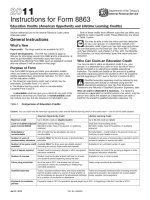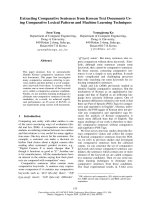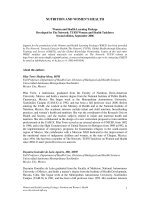falstaff and king lear
Bạn đang xem bản rút gọn của tài liệu. Xem và tải ngay bản đầy đủ của tài liệu tại đây (29.12 KB, 3 trang )
Falstaff and King Lear Shakespeare's tragedy King Lear is a
detailed description of the consequences of one man's decisions. This
fictitious man is Lear, King of England, who's decisions
greatly alter his life and the lives of those around him. As Lear bears the
status of King he is, as one expects, a man of great power
but sinfully he surrenders all of this power to his daughters as a
reward for their demonstration of love towards him. (Cain) This untimely
abdication of his throne results in a chain reaction of events
that send him through a journey of hell. King Lear is a metaphorical
description of one man's journey through hell in order to
expiate his sin. As the play opens one can almost immediately see that
Lear begins to make mistakes that will eventually result in his
downfall. (Neher) This is the first and most significant of the
many sins that he makes in this play. By abdicating his throne to fuel his
ego he is disrupts the great chain of being which states that
the King must not challenge the position that God has given him. This
undermining of God's authority results in chaos that tears apart
Lear's world. (Williams) Leaving him, in the end, with nothing.
Following this Lear begins to banish those around him that genuinely care
for him as at this stage he cannot see beyond the mask that
the evil wear. He banishes Kent, a loyal servant to Lear, and his youngest
and previously most loved daughter Cordelia. (Nixon) This
results in Lear surrounding himself with people who only wish to use him
which leaves him very vulnerable attack. This is precisely
what happens and it is through this that he discovers his wrongs and
amends them. Following the committing of his sins, Lear becomes
abandoned and estranged from his kingdom which causes
him to loose sanity. While lost in his grief and self-pity the fool is
introduced to guide Lear back to the sane world and to help
find the lear that was ounce lost behind a hundred Knights but now is out
in the open and scared like a little child. (Bradley) The fact
that Lear has now been pushed out from behind his Knights is
dramatically represented by him actually being out on the
lawns of his castle. The terrified little child that is now unsheltered is
dramatically portrayed by Lear's sudden insanity and his rage
and anger is seen through the thunderous weather that is being
experienced. All of this contributes to the suffering of Lear
due to the gross sins that he has committed. The pinnacle of this hell that
is experienced be Lear in order to repay his sins is at the end
of the play when Cordelia is killed. Lear says this before he
himself dies as he cannot live without his daughter. (Bradley)
All of this pain that Lear suffered is traced back to the single most
important error that he made. The choice to give up his
throne. This one sin has proven to have massive repercussions upon
Lear and the lives of those around him eventually killing
almost all of those who were involved. And one is left to ask one's self if a
single wrong turn can do this to Lear then what difficult corner
lies ahead that may cause similar alterations in one's life.
There has been many different views on the plays of William
Shakespeare and definitions of what kind of play they were.
The two most popular would be the comedy and the tragedy. King Lear to
some people may be a comedy because they believe that the
play has been over exaggerated. Others would say King Lear was a
tragedy because there is so much suffering and chaos. What
makes a Shakespearean play a comedy or a tragedy? King Lear would
be a tragedy because it meets all the requirements of a
tragedy as defined by Andrew Cecil Bradley. Bradley states that a
Shakespearean tragedy must have to be the story of the hero
and that there is exceptional suffering and calamity slowly being worn in
as well as it being contrasted to happier times. The play also
depicts the troubled parts in his life and eventually his death that
is instantaneous caused by the suffering and calamity. There is the
feeling of fear in the play as well, that makes men see how
blind they are not knowing when fortune or something else would be on
them. (Cain) The hero must be of a high status on the chain
and the hero also possesses a tragic flaw that initiates the tragedy. The
fall of the hero is not felt by him alone but creates a chain
reaction which affects everything below him. Henry IV is a very different
composition. Falstaff the main character is clearly a
prankster, and not nearly as many horrible things happen to him. Falstaff
is the character we laugh at, a mock King in Henry IV. Hal is
the ideal King and Falstaff is a Lord of Misrule. Up to certain point Falstaff
is merely an object of pure entertainment. His character is
present chiefly for the humor that arises by showcasing his
ludicrous traits. Why should we laugh at a man with a huge belly and an
appetite to match, at the way he suffers on a hot day, his
cumbersome size and the liveliness of his spirit. His timeless age and his
youthful lightness of heart show his true nature. Why do we
find comedy in the enormity of his lies and the suddenness of their
exposure and frustration. The contrast between his reputation
and his real character, seen most absurdly when, at the mere mention of
his name, a rebel surrenders to him. (Neher) What is it about
Falstaff that caused us to laugh at these and many such things? Here we
have them poured out in endless profusion and with that air
of careless ease which is so fascination in Shakespeare. But while
they are quite essential to the character, there is much more than
just fun in him. These things by themselves do not explain
why, besides laughing at Falstaff, we are made happy by him and laugh
with him. But while they are quite essential to the character,
there is an ugly side of Falstaff, but we overlook it in light of his great
humor. The two compositions have humorous parts in them
but both are distinctly different. Henry IV is clearly a comedy with
almost all the traits of a comedy while King Lear is not as Clear cut but
is definitely not either one. Falstaff and King Lear are
somewhat dissimilar. King Lear deals with all of the problems from one of
his actions, abdication of his throne. Falstaff deals with the
situations surrounding the prince and the different paths he can take with
his life. The two characters share a troubled past and an even
more troubling future but that is the extent of their similarity.
What draws us in and makes us like Falstaff? If you ask what he enjoys,
no doubt the answer is first and foremost, eating and
drinking, then relaxing at the inn with his other merry friends and
companions. These things are what really matter to Falstaff.
Compared to King Lear who is extremely unhappy and is on a quest to
regain his happiness which is ultimately impossible. Falstaff
indulgences cause him to slowly lose his life and alienate the people
around him. Like King Lear they both lose possessions along
their journey. They are alike in many ways but take different ways to meet
their ends. Their experiences are different but their end is the
same.









